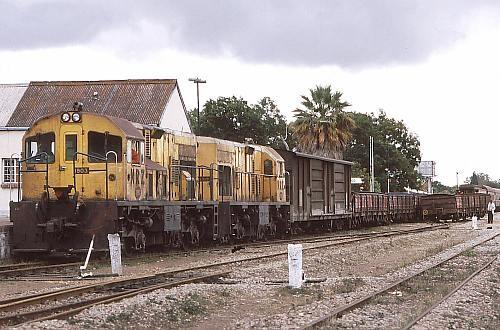Business / Companies
Zimbabwe's broken railways threaten lithium, tobacco exports
16 Aug 2025 at 12:33hrs |
23 Views

Zimbabwe's crumbling railway system, once the backbone of the economy, has become a major obstacle to growth, inflating transport costs, stifling exports, and threatening emerging sectors such as lithium and tobacco, economist Eddie Cross has warned.
Cross, a former Monetary Policy Committee member, said decades of neglect, underinvestment, and mismanagement have left the network in near-collapse. "The entire network is broken… we are running eight trains a day on the entire network," he said.
The inefficiency is forcing companies to rely on costly road haulage. Lithium producers, whose output is forecast to reach 10 million tons in three years, are particularly hard-hit. Transporting lithium from mines to ports can cost up to US$1,500 per ton, eroding Zimbabwe's competitiveness in the global market.
Tobacco exporters are also losing out. "It costs US$6,000 to move a container from Harare to Durban, while the Chinese pay US$2,000 to move a container from China to Chicago," Cross said, highlighting the structural drag on the economy.
Cross dismissed the government's recent $7 million allocation to the railway sector as "pocket money," warning that without large-scale rehabilitation-including track renewal, modern rolling stock, and professional management- Zimbabwe will continue bleeding revenue and relying on inefficient road transport.
Responding to Cross's claims, National Railways of Zimbabwe spokesperson Andrew Kunambura said the system operates more trains than reported, noting eight trains run in each direction on multiple routes daily, including Bulawayo - Chicualacuala and Harare - Beira.
Despite this, Cross maintained that the railway system's current state is undermining Zimbabwe's export potential, urging urgent, decisive intervention to restore the network and protect key industries.
Cross, a former Monetary Policy Committee member, said decades of neglect, underinvestment, and mismanagement have left the network in near-collapse. "The entire network is broken… we are running eight trains a day on the entire network," he said.
The inefficiency is forcing companies to rely on costly road haulage. Lithium producers, whose output is forecast to reach 10 million tons in three years, are particularly hard-hit. Transporting lithium from mines to ports can cost up to US$1,500 per ton, eroding Zimbabwe's competitiveness in the global market.
Cross dismissed the government's recent $7 million allocation to the railway sector as "pocket money," warning that without large-scale rehabilitation-including track renewal, modern rolling stock, and professional management- Zimbabwe will continue bleeding revenue and relying on inefficient road transport.
Responding to Cross's claims, National Railways of Zimbabwe spokesperson Andrew Kunambura said the system operates more trains than reported, noting eight trains run in each direction on multiple routes daily, including Bulawayo - Chicualacuala and Harare - Beira.
Despite this, Cross maintained that the railway system's current state is undermining Zimbabwe's export potential, urging urgent, decisive intervention to restore the network and protect key industries.
Source - Business Times
Join the discussion
Loading comments…

















